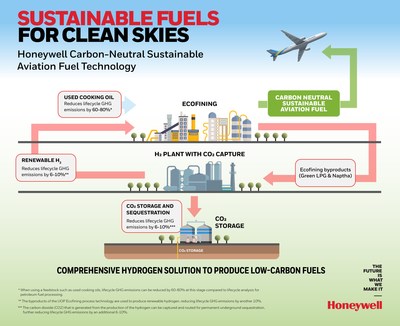Honeywell And Wood Introduce Groundbreaking Technologies To Support Efforts Toward Carbon-Neutral Sustainable Aviation Fuel
Honeywell and Wood have unveiled innovative technologies aimed at producing carbon-neutral aviation fuel. Their collaboration utilizes Honeywell's UOP Ecofining and Wood's hydrogen plant technologies to achieve up to 100% reduction in lifecycle greenhouse gas emissions compared to traditional jet fuels. By converting waste oils and fats into Honeywell Green Jet Fuel, emissions can be decreased by 80%. The integration of technologies can further enhance this by generating renewable hydrogen, which contributes to a cleaner fuel process. This partnership aligns with the U.S. Sustainable Aviation Fuel Grand Challenge, targeting 3 billion gallons of sustainable aviation fuel by 2030.
- Collaboration aims for up to 100% reduction in lifecycle GHG emissions compared to traditional fuels.
- Utilizes waste oils to produce Honeywell Green Jet Fuel, reducing emissions by 80%.
- Integration with Wood's technology enhances hydrogen production, further lowering emissions.
- Supports U.S. Sustainable Aviation Fuel Grand Challenge aiming for 3 billion gallons by 2030.
- None.
Insights
Analyzing...
DES PLAINES, Ill. and ABERDEEN, Scotland, Sept. 23, 2021 /PRNewswire/ -- Honeywell (NASDAQ: HON) and Wood (LSE: WG) today announced a comprehensive package of technologies to support the effort to produce carbon-neutral aviation fuel. When used together, the technologies, which are based on Honeywell's UOP Ecofining process technology and Wood's hydrogen plant technology, could reduce lifecycle greenhouse gas emissions (GHG) by
The UOP Ecofining process technology converts waste oils, fats, and greases into Honeywell Green Jet FuelTM, a drop-in replacement for jet fuel. When using a feedstock such as used cooking oils, lifecycle GHG emissions can be reduced by
As the next step in enhancing the Ecofining process technology offering, Wood's technology will be integrated to use the byproducts of the UOP Ecofining process technology to produce renewable hydrogen, reducing lifecycle GHG emissions a further
The carbon dioxide (CO2) that is generated from the production of the hydrogen can be captured and routed for permanent underground sequestration using the Honeywell H2 Solutions technology suite, further reducing lifecycle GHG emissions an additional
"The combination of these technologies from Honeywell and Wood greatly reduces fossil carbon dioxide emissions compared to traditional fuels by using byproducts to provide hydrogen for the Ecofining process," said Ben Owens, vice president and general manager of Honeywell Sustainable Technology Solutions. "As a result, a renewable fuels refinery can be essentially self-sustaining in hydrogen production while reducing the carbon intensity of the renewable fuels to very low levels."
"Wood has a rich history of collaborating on technology developments with Honeywell and together we are now producing solutions for the production of carbon-neutral renewable fuels," said Andy Hemingway, President, Energy, Optimization, and Innovation, at Wood. "This solution utilizes our long-established experience in hydrogen plant technology to help fuel producers reduce operating costs while meeting sustainability goals with proven, reliable and efficient technologies."
Recently, the U.S. Department of Energy (DOE), the U.S. Department of Transportation (DOT), the U.S. Department of Agriculture (USDA), and other federal government agencies worked together to introduce the Sustainable Aviation Fuel Grand Challenge with a goal to produce 3 billion gallons per year of sustainable aviation fuel by 2030 in the U.S. If those 3 billion gallons of SAF were produced using Honeywell's comprehensive package of technologies, it could result in the equivalent of 34 million metric tons of cumulative carbon dioxide avoided per year, depending on the oil and fat feedstock mix used.
The UOP Ecofining process has been used for commercial production of sustainable aviation fuel since 2016 by World Energy in California. The facility remains the only
Wood is a FTSE 250 company and a global leader in engineering and consultancy across energy and the built environment, helping to unlock solutions to some of the world's most critical challenges. The company provides consulting, projects, and operations solutions in more than 60 countries, employing around 40,000 people. Wood is a pioneer in hydrogen production technology with an experience list of more than 120 hydrogen and synthesis gas plants worldwide. Wood's hydrogen technology, based on their unique Terrace Wall™ reforming furnace, has been selected for more than 120 hydrogen and synthesis gas plants worldwide.
Honeywell UOP (www.uop.com) is a leading international supplier and licensor of process technology, catalysts, adsorbents, equipment, and consulting services to the petroleum refining, petrochemical, and gas processing industries. Honeywell UOP is part of Honeywell's Performance Materials and Technologies strategic business group, which also includes Honeywell Process Solutions (www.honeywellprocess.com), a pioneer in automation control, instrumentation and services for the oil and gas, refining, petrochemical, chemical and other industries.
Honeywell (www.honeywell.com) is a Fortune 100 technology company that delivers industry specific solutions that include aerospace products and services; control technologies for buildings and industry; and performance materials globally. Our technologies help everything from aircraft, buildings, manufacturing plants, supply chains, and workers become more connected to make our world smarter, safer, and more sustainable. For more news and information on Honeywell, please visit www.honeywell.com/newsroom.
# # #
Honeywell media contact:
(973) 216-0684
tehani.manochio@honeywell.com
Wood media contact:
Press Office
press.office@woodplc.com
![]() View original content to download multimedia:https://www.prnewswire.com/news-releases/honeywell-and-wood-introduce-groundbreaking-technologies-to-support-efforts-toward-carbon-neutral-sustainable-aviation-fuel-301383441.html
View original content to download multimedia:https://www.prnewswire.com/news-releases/honeywell-and-wood-introduce-groundbreaking-technologies-to-support-efforts-toward-carbon-neutral-sustainable-aviation-fuel-301383441.html
SOURCE Honeywell








